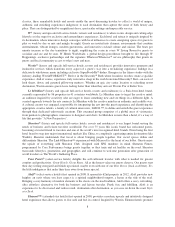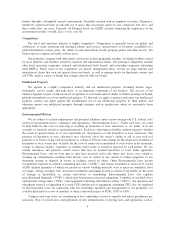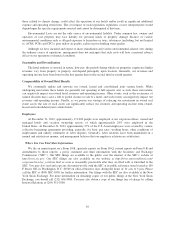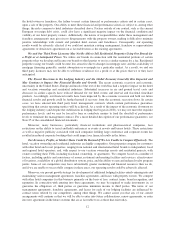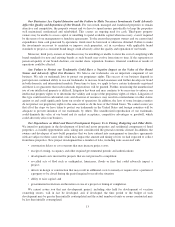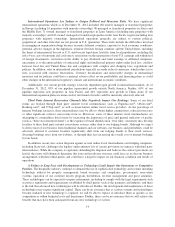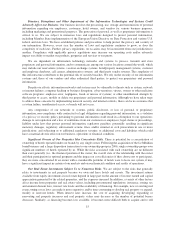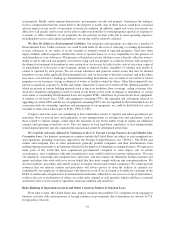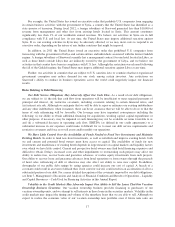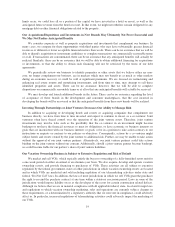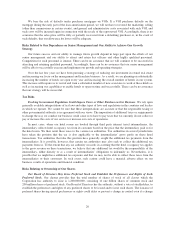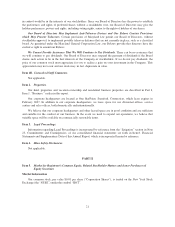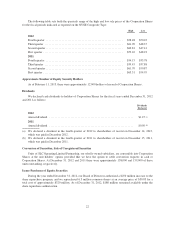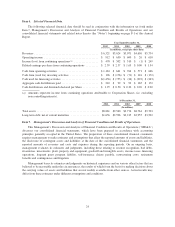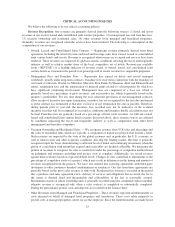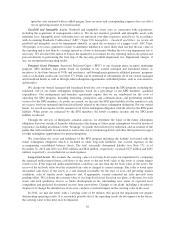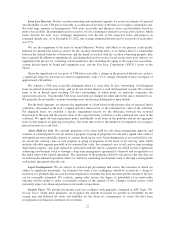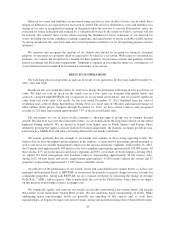Starwood 2012 Annual Report Download - page 117
Download and view the complete annual report
Please find page 117 of the 2012 Starwood annual report below. You can navigate through the pages in the report by either clicking on the pages listed below, or by using the keyword search tool below to find specific information within the annual report.temporarily or indefinitely delayed, such delays may result in either increased borrowings to provide capital to
replace anticipated proceeds from such sales or reduced spending in order to maintain our leverage and return
targets.
Risks Relating to So-Called Acts of God, Terrorist Activity and War
Our financial and operating performance may be adversely affected by so-called acts of God, such as natural
disasters, in locations where we own and/or operate significant properties and areas of the world from which we
draw a large number of customers. For example, in 2011, our hotels in Japan and Thailand experienced reduced
bookings as a result of the tsunami and flooding, respectively, in these countries. Similarly, wars (including the
potential for war), terrorist activity (including threats of terrorist activity), political unrest and other forms of civil
strife and geopolitical uncertainty have caused in the past, and may cause in the future, our results to differ
materially from anticipated results. In 2011, our hotels in Syria, Tunisia, Libya and Egypt experienced reduced
bookings as a result of the political climate in these countries. If these conditions do not improve, our financial
results could be negatively impacted.
Risks Related to Pandemic Diseases
Our business could be materially and adversely affected by the effect of a pandemic disease on the travel
industry. For example, the past outbreaks of SARS and avian flu had a severe impact on the travel industry. A
prolonged recurrence of SARS, avian flu, swine flu or another pandemic disease also may result in health or
other government authorities imposing restrictions on travel. Any of these events could result in a significant
drop in demand for our hotel and vacation ownership businesses and adversely affect our financial condition and
results of operations.
Our Insurance Policies May Not Cover All Potential Losses
We carry insurance coverage for general liability, property, business interruption, and other risks with
respect to our owned and leased properties and we make available insurance programs for owners of properties
we manage. These policies offer coverage terms and conditions that we believe are usual and customary for our
industry. Generally, our “all-risk” property policies provide that coverage is available on a per occurrence basis
and that, for each occurrence, there is a limit as well as various sub-limits on the amount of insurance proceeds
we will receive in excess of applicable deductibles. In addition, there may be overall limits under the policies.
Sub-limits exist for certain types of claims such as service interruption, debris removal, expediting costs or
landscaping replacement, and the dollar amounts of these sub-limits are significantly lower than the dollar
amounts of the overall coverage limit. Our property policies also provide that for the coverage of critical
earthquake (California and Mexico), named windstorm and flood, all of the claims from each of our properties
resulting from a particular insurable event must be combined together for purposes of evaluating whether the
annual aggregate limits and sub-limits contained in our policies have been exceeded and any such claims will
also be combined with the claims of owners of managed hotels that participate in our insurance program for the
same purpose. Therefore, if insurable events occur that affect more than one of our owned hotels and/or managed
hotels owned by third parties that participate in our insurance program, the claims from each affected hotel will
be added together to determine whether the per occurrence limit, annual aggregate limit or sub-limits, depending
on the type of claim, have been reached and if the limits or sub-limits are exceeded each affected hotel will only
receive a proportional share of the amount of insurance proceeds provided for under the policy. In addition, under
those circumstances, claims by third party owners will reduce the coverage available for our owned and leased
properties.
In addition, there are also other risks including but not limited to war, certain forms of terrorism such as
nuclear, biological or chemical terrorism, political risks, some environmental hazards and/or acts of God that
may be deemed to fall completely outside the general coverage limits of our policies or may be uninsurable or
may be too expensive to justify insuring against.
We may also encounter challenges with an insurance provider regarding whether it will pay a particular
claim that we believe to be covered under our policy. Should an uninsured loss or a loss in excess of insured
18


